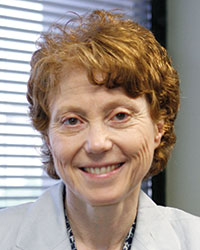Observation
Newcombe to Discuss Integrative Approach to Cognitive Science in Convention Speech
 Temple University psychologist Nora Newcombe has received a 2014 William James lifetime achievement award from APS, in honor of her role in advancing the field of cognitive science. Newcombe will deliver her award address, “Resolving the Nativist-Empiricist Debate: A Neoconstructivist Approach to Cognitive Development,” at the 26th APS Annual Convention, to be held May 22-25, 2014, in San Francisco.
Temple University psychologist Nora Newcombe has received a 2014 William James lifetime achievement award from APS, in honor of her role in advancing the field of cognitive science. Newcombe will deliver her award address, “Resolving the Nativist-Empiricist Debate: A Neoconstructivist Approach to Cognitive Development,” at the 26th APS Annual Convention, to be held May 22-25, 2014, in San Francisco.
Newcombe has made vast contributions to the understanding of spatial cognition — the mental visualization of two- and three-dimensional objects. Making Space, a 2000 book she co-authored with APS William James Fellow Janellen Huttenlocher, fused classic theories of both learned and innate spatial reasoning to create a new conceptualization of cognitive development.
Newcombe has also challenged gender stereotypes about spatial reasoning ability. While men are more skilled at mental rotation, horizontality and verticality tasks, and mechanical reasoning, discrepancies between the sexes in navigation abilities cannot be directly attributed to these spatial ability differences.
She has led the Spatial Intelligence and Learning Center (SILC), which is funded by the National Science Foundation and explores learning in an interdisciplinary framework. She has thus brought spatial cognition to the forefront of society’s understanding of human intellect.
Newcombe has also extensively studied memory and memory development, integrating research from adult cognitive psychology and neuroscience to the exploration of implicit and explicit memory distinctions and differences between semantic and episodic memory.





Comments
Nora Newcombe is brilliant. She’s my favorite psychologist.
APS regularly opens certain online articles for discussion on our website. Effective February 2021, you must be a logged-in APS member to post comments. By posting a comment, you agree to our Community Guidelines and the display of your profile information, including your name and affiliation. Any opinions, findings, conclusions, or recommendations present in article comments are those of the writers and do not necessarily reflect the views of APS or the article’s author. For more information, please see our Community Guidelines.
Please login with your APS account to comment.